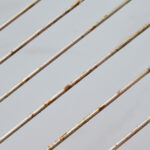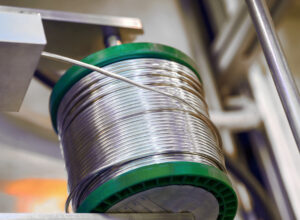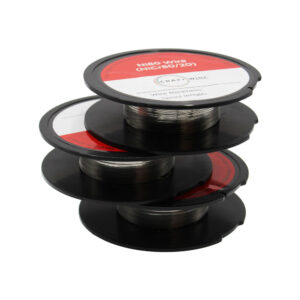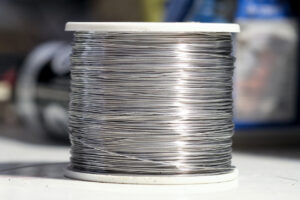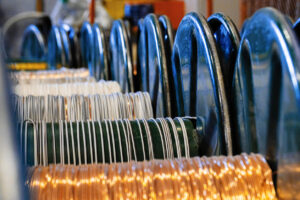Solderable wire forms the invisible yet indispensable backbone of countless electronic and electrical applications, bridging connections with reliability and precision.
As its name implies, solderable wire is designed for use with solder, a fusible metal alloy used in electronics and electrical work to create strong, conductive joints. Everything from intricate electronic circuits to robust electrical installations depends on the ability to solder wires effectively. Due to its specific properties that facilitate smooth soldering and durable connections, solderable wire stands out in the vast landscape of wiring requirements.
From delicate electronics to large-scale electrical projects, our carefully curated selection of solderable wires is designed to meet your needs. The range of options we offer ensures that our customers find the perfect match for their soldering needs, each with its unique characteristics and advantages. All levels of demand are met with unwavering quality and performance with our solderable wire range, whether you are a professional technician, an electronics hobbyist, or involved in industrial applications.
Basics of Solderable Wire
Wires that are solderable are those that readily accept solder, allowing for efficient and reliable joint formation. Wire materials and coatings are typically used to achieve this compatibility. In various applications, solderable wire ensures secure and conductive connections due to its ease of soldering.
The importance of solderability becomes evident in electrical and electronic applications. To ensure stable and lasting connections on circuit boards, solderable wire is used to connect components on circuit boards. For electrical safety and efficiency, these wires facilitate connections that are both mechanically strong and electrically conductive.
Types of Solderable Wires We Offer
At The Crazy Wire Company, our range of solderable wires includes:
Tin-Coated Copper Wire: Copper wire with a tin coating enhances its solderability and conductivity. Due to the tin coating, the copper does not oxidise, ensuring that the wire remains solderable for a longer period of time. The wire is ideal for electronics that require long-term reliability of connections.
Silver Wire: Silver wire’s high conductivity and thermal stability make it an excellent choice for high-frequency applications and environments with fluctuating temperatures. Due to its natural affinity for solder, it is a preferred choice in precision electronic work.
Lead-Free Solder Wire: Lead-free solder wire offers good solderability and lower environmental and health impacts than lead-based solder wire. It is becoming increasingly popular in consumer electronics manufacturing.
Wires with different features are suitable for different soldering applications. With our range of wires, you will be able to find the right wire for your specific soldering needs, including flexibility, ease of use, and conductivity.
Can Copper Wire Be Used as a Solder? Understanding the Limitations
A common question that arises among enthusiasts and professionals alike is whether copper wire can be used as a solder. Initially, copper’s excellent conductivity and widespread use in electrical applications might indicate its viability as a soldering material. To answer this question, it is crucial to understand the fundamental properties and uses of solder.
The Role of Solder in Electrical Connections
The purpose of solder is to melt and flow at relatively low temperatures, creating a secure and conductive bond between components. An alloy, like tin and lead (or lead-free alternatives), is usually used, which has a lower melting point than the components being joined.
Copper Wire Characteristics
Copper wire, while excellent for conducting electricity, does not possess the low melting point characteristics essential for effective soldering. The melting point of copper is 1,984°F (1,085°C), much higher than that of traditional solders. Due to its high melting point, copper cannot be used as a solder without damaging the components first.
Potential Risks and Limitations
Using copper wire as a solder could result in several issues:
- Risk of Component Damage: The high temperature required to melt copper can damage the electronic components or the circuit board.
- Poor Adhesion and Conductivity: Even if melted, copper does not possess the same adhesion properties as solder, potentially leading to weak or unreliable connections.
- Safety Concerns: Melting copper requires temperatures that pose a significant safety risk, especially without proper equipment.
Even though copper wire is essential for creating pathways for electricity, it cannot be used as a solder. Material designed specifically for soldering is always recommended for effective and safe soldering. Our range of soldering wires and materials ensures that you have access to the right tools for your soldering project. Feel free to contact our expert team for any guidance or questions regarding soldering materials.
Factors to Consider When Choosing Solderable Wire
Selecting the right solderable wire is a nuanced process that involves considering several key factors to ensure optimal performance and durability in your soldering projects:
Gauge: The gauge, or thickness, of the wire determines its current carrying capacity and flexibility. For delicate, precision work in electronics, thinner wires (higher gauge numbers) are ideal, while thicker wires (lower gauge numbers) are better suited to higher current applications. We recently wrote a detailed blog explaining how Standard Wire Gauge converts to millimetres.
Flexibility: The wire’s flexibility can be critical depending on your application. Intricate soldering in confined spaces or complex circuit designs are easier with flexible wires.
Corrosion Resistance: Wires with good corrosion resistance, such as tin-coated copper or silver wire, ensure the longevity and reliability of soldered connections in harsh environments.
Temperature Tolerance: You should consider the operational temperature range of your project. Some solderable wires are better suited for high-temperature environments, maintaining integrity where others may fail.
In order to choose the right wire for your soldering project, you must balance these factors with your project’s requirements. A silver wire might be preferred for high-frequency electronic applications because of its superior conductivity and thermal stability, while tin-coated copper wire is versatile for electronic applications.
Soldering Techniques and Tips
Effective soldering requires more than just the right wire; it also involves proper techniques and practices:
Preparation: Ensure the wire and soldering iron tip are clean and oxidation-free. Solder adheres better to a clean surface.
Heat Management: It is important to use the right temperature setting on your soldering iron – too hot can damage components or the wire, too cold will cause the solder to flow improperly.
Solder Application: Solder should be applied to the joint, not the iron tip. A smooth, even joint should be formed around the wire as a result of the heat.
Avoid Overheating: Wire insulation and components can be damaged by prolonged heat. Work swiftly to minimise heat exposure.
Common Mistakes to Avoid:
- Avoid using excessive solder, which can lead to cold joints and connectivity issues.
- Don’t move the joint until the solder has cooled and solidified.
Applications of Solderable Wire
Solderable wire finds its place in a variety of applications:
Electronics: Solderable wire is a crucial component of circuit boards, wiring harnesses, and electronic devices.
Jewelry Making: Solderable silver wire is often used in jewelry making for crafting intricate designs and ensuring durable joints.
Case Study: In a recent project involving the development of custom audio equipment, our high-grade silver solderable wire provided excellent sound quality and reliability due to its superior electrical properties.
Why Choose The Crazy Wire Company for Your Solderable Wire Needs?
Crazy Wire Company stands out as a beacon of quality, variety, and expertise when it comes to solderable wire. We guarantee that every wire we sell meets or exceeds industry standards due to our commitment to providing only the highest quality wires. Since every soldering project has its own unique requirements, we offer a wide variety of solderable wires, including tin-coated copper, silver wire, and lead-free options.
Our expertise in the field of wires is not just limited to the products we offer. Customer service and support are Crazy Wire Company’s top priorities. Our team of knowledgeable experts will assist you in choosing the perfect wire for your specific needs, making sure you make an informed choice. We provide guidance and support to both seasoned professionals and beginners in soldering.
Understanding solderable wire – from selecting the right gauge and material to employing the best soldering techniques – is essential for the success of any project that involves soldering. We offer a comprehensive range of high-quality solderable wires, backed by exceptional customer service, making us your ideal partner for all your soldering needs. If you have any specific requirements or advice, we encourage you to explore our diverse range. You gain more than just wire from The Crazy Wire Company; you gain a partner dedicated to helping you achieve the best results.
We offer also a massive range of stainless steel wire and nichrome wire through our store. Choose the wire that you want to work with and we’ll get spooling.
If you’re interested in learning more about wire, check out our other blog on Everything You Need to Know About Wires.
We are also proud to supply this product on our highly popular eBay store, check us out there too.
Thank you for checking out our site.
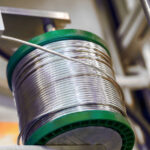
Nichrome Wire Safety: Top Tips for Working Safely
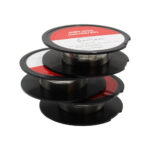
Best Wire for Electronics Projects
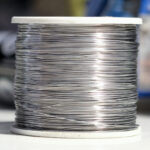
Is Ni80 Wire Suitable for DIY Heating Elements
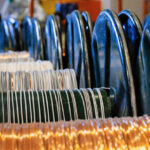
Wire Grades Explained
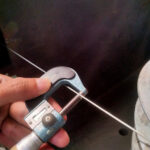
How Wire Diameter Affects Strength and Flexibility
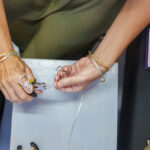
How to Cut and Shape Wire for Custom Applications

Can Wire Be Used in 3D Printing?
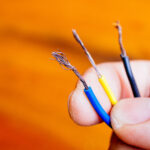
How Wire Composition Affects Conductivity
